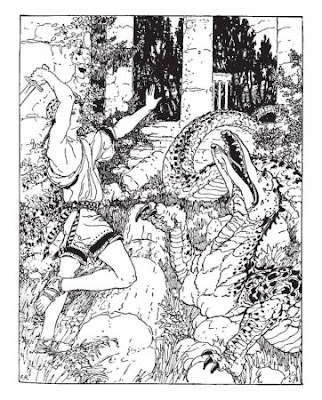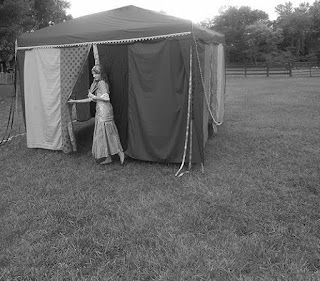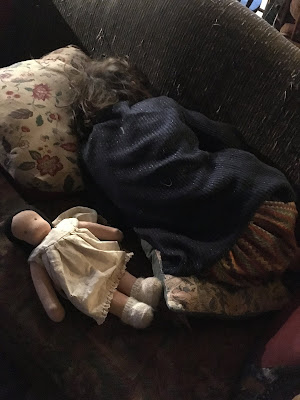The Wolves of Want and the Wyrms of Wealth
In Eden,
God had stored up all happiness for humans, giving them not only the Tree of Life
but all other fruits in the world, save one. That condition upon which
happiness hung was obedience to one command: do not eat from the one tree. But
Adam and Eve failed the test of obedience, and so we struggle both to feed and
clothe ourselves, but most of all, we struggle to obey. Fortunately, we have so
great a Savior, Who was obedient unto death.
Obedience
is a form of poverty. It is a lack: a lack of freedom. Compelled obedience is
indeed a poverty, or so we believe instinctually. We love freedom and options,
and free will makes such freedom to choose satisfying. A lack of freedom due to
obedience runs counter to our humanness.
And yet freely choosing to obey against the
inclination of the moment is a deeper freedom, because it sets us free from that
inclination of the moment. I value exercise, but at the moment my daily routine
begins, I would rather sleep. Obedience to “I should” frees me from clamorous
frenzy of “I would.”
As I think
of my buying habits, I think of how often the siren song of the impulse
afflicts me. I spot something and am drawn to it as by hypnosis: once, early in
my marriage, I saw at the discount store a stack of three hatboxes in the most
alluring pattern, which I “fell in love with.” For days I was tormented by
those hatboxes, which seemed so pretty and useful, but which I could not
justify buying. I was young and used to being mistress of my own purse, and
learning to think as a joint partner in a marriage was difficult for me. I did
not buy them, but I remember how agonizing the compulsion was. I am truly not
detached from the material delights of the eye. It was obedience to my
husband’s request that the money be spent only on food and because I valued our
joint decision-making. We were newly married, and our beautiful love was very
fragile: who knows what damage that disobedience to our joint resolution might have
done? And yet by obeying, I remained free of the hatboxes and free to pursue
what I really wanted. In this way, the poverty of obedience set me free.
The
budget, jointly drawn up with one’s spouse or even, when the children are
older, one’s family, is a joint promise of obedience, a monetary vow of poverty
than can monasticize your finances by allowing God to be the divider and judge.
When renewed in season, it is like the election of a new abbot, a new guide map
through the woods.
The maps
of old had not only directions but also warnings: warnings against wolves in
the forest or serpents in the deep. So, our budget warns us not only against
the wolves of want but the dragons of abundance.
We of the
middle class have long ago fallen into the hands of the wolves of want,
although our destitution has been nicely euphonized as debt. There are Davids
out there to help us learn how the slingshot the Goliath of consumer debt, and
we indeed need them. But when it comes to consumer debt, one can see how the
wolves of want and the dragons of abundant wealth work hand in hand. The dragon
promises to deliver us wealth—for the moment—and he does! But then the wolves
close in to decimate our credit score.
But at
times the dragons work alone. And as we work hard to keep the wolves from the
door, we need to also keep the dragons from our dreams. These are the dragons of catastrophic wealth.
Catastrophic
wealth means an overabundance too great to meet our established needs which
demands entry not just to our homes but our hearts. Are we on guard against this dragon?
Dragons
are not good for children. One problem of the rich is how to guard the souls of
their children who are used to wealth, for whom material goods are an
entitlement. Think of the rich young man who, confronted with Christ and
eternal riches, went away sad. The holds that goods have upon a soul are more
clutching and insidious than the drill and tentacles of a virus. Christ warns
us against them. Camels go through needles more easily than wealth is detached
from the human heart. We should not let
the specter of naked, hungry children blind us to the evil of sated, cold-hearted
indifference of the well-heeled. We are warned that bringing a soul to Christ
is near to impossible under those conditions. Fear wealth for your children. It
is the invisible dragon who wishes to swallow your children so that they cannot
imagine life outside of its warm and comfortable bowels. Do not be envious for its gaping maw and
slithering tunnel. “So is he who lays up treasure for himself and is not rich
towards God.”
The only
way to defeat the dragon is to send it away and in haste with superabundant
generosity. Do not let it languish in storage boxes but send it away as quickly
as it comes. Go into the highways and byways and give it away. Make friends for
yourself with unrighteous mammon so that when you are turned out of this world
into the cold of the grave, you will have those who will take you in and plead
for your soul.
Certainly,
there are many of us who need to care about money because we do not make
enough, or our habits of indulgence keep us continually in debt or
impoverished. For us, a right relationship with money is no less crucial.
Without it, our striving towards balance in our finances will lack something
Christian about it: the secular part of our brain will continually dream of
winning the lottery to solve all our problems. Here Lady Poverty is the friend
who keeps your soul from hell: we may imagine in our immaturity that we could
easily slay the dragon of catastrophic wealth if it descended upon us, but the
Lady knows better. She keeps the dragon at bay for us. It might be good for us
to pray that we may grow wiser regarding wealth, that we might be able to
withstand the alluring promises of power, the falsity of wealth-based
friendships, the suffering that comes with facing problems that money cannot
solve. Poverty saves us from all these dragons, though she is unappreciated for
her pains. The poverty of Our Lord is reverenced but still feared: we fail to
see the great freedom He dwelled in. Knowing this, we can begin to pray that
prayer, to draw near to Lady Poverty, to recognize her as the crucial component
of growing closer to Christ.
It was
Suzanne Fowler, who founded the apostolate of Light Weigh, who helped me see
the connection between dragons and wolves when it comes to food. I struggle to
have a right relationship to food, as many Americans do. She points out that
when we feel hunger pangs, we don’t need to satiate them by wolfing down as
much food as we can possibly hold. Stomach expansion and consequent health
problems result. But if instead of either starving ourselves or gorging on overabundance,
we merely slowly and thankfully enjoy one “fistful” of food, we will be
satisfied. When it comes to food, we understand that there is such a thing as
too much food. By analogy, we need to learn that there is such a thing as too
much money.
We will
never truly be followers of Christ until we have faced the hidden dragon of
wealth, small as a microscopic worm in the belly, yet large enough to keep
whole nations in thrall. For if you love the wealth you own, you fear its loss,
and that fear imprisons you and keeps you from truly trusting Christ and your
Heavenly Father. Do we not know that He loves us? He will not let His children
go hungry. He will provide if we truly need Him to. Call upon Him in our need
and be content with what He gives us. Often it is so much more than we asked
for.



Comments